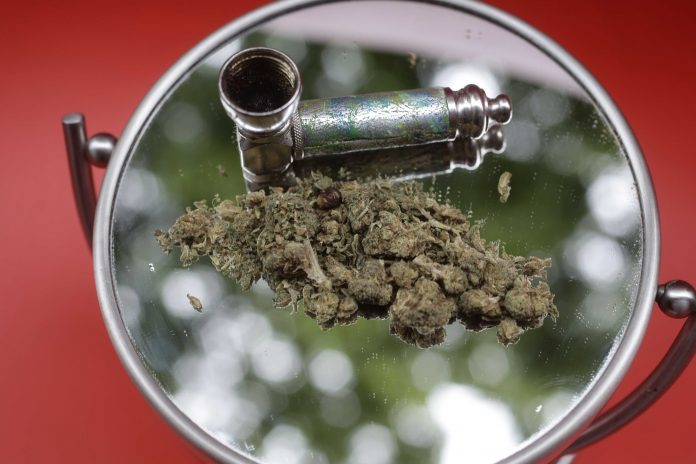
By JENNIFER PELTZ
Associated Press
NEW YORK (AP) — While New York works on launching a legal market for recreational marijuana, some entrepreneurs dove into a legal gray area by saying they’re not selling pot but giving it away while people buy something else.
Now, the state is saying they have jumped the gun and need to stop.
The Office of Cannabis Management said Tuesday it sent letters to more than two dozen enterprises it suspects of illegally selling weed. They were told to stop or face fines, potential criminal charges and risk to their prospects of getting a license once they are available.
“New York state is building a legal, regulated cannabis market that will ensure products are tested and safe for consumers” and will provide opportunities for people affected by the enforcement of now-scrapped marijuana laws, OCM Executive Director Chris Alexander said in a statement. “Illegal operations undermine our ability to do that.”
The state law that legalized recreational marijuana last spring doesn’t discuss such “gifts” but does allow “transferring, without compensation” small amounts of pot.
The agency wouldn’t say what entities got letters. Messages were left with several businesses that have gone public about providing weed in what they insist is a legal way.
Hempsol CBD owner Jim Mackenzie said Wednesday his shop in Rochester didn’t get a letter but will nonetheless stop offering a “gift” of marijuana to customers who buy a T-shirt or other garment — a deal he believed was legal.
“But I’m going to do what the state wants because my goal is to have a state (marijuana) license,” said Mackenzie. He feels the state would be wiser to get to know businesses like his shop, where he prides himself on educating customers about cannabis. CBD is a popular non-intoxicating chemical that’s prevalent in hemp, a form of cannabis that Congress legalized in 2018.
“It’s really in their best interest to work with the people who are actually trying to do it correctly and actually have knowledge in this industry,” he said.
As the state works out rules to apply for licenses to sell marijuana, some businesses have started offering the drug as a “gift” to people who make what’s described as a donation, or who buy art or some other item. Others say they’re clubs that acquire cannabis and provide their paying members with access to it.
To the state cannabis office, illegal sales “include so-called ‘gifting’ where consumers purchase non-cannabis items or services, such as a membership in a club, and are then provided cannabis as part of the sale,” according to a sample warning letter that the agency released.
The letter, which tells recipients to stop “illegal activity” immediately, comes after state Cannabis Control Board Chair Tremaine Wright warned in October of “severe financial penalties” for pot “gifting” connected to sales of other goods and services.
No such letter has arrived at Happy Munkey, a New York City-based business that has put on “bring your own” cannabis-themed events where goodie bags included a joint, spokesperson Stu Zakim said. He says that’s not “gifting” tied to a purchase, but rather “doing what any sponsor does — provide a goodie bag to give away their product to help influence people.”
While the cannabis agency’s action might not affect Happy Munkey, Zakim called it “offensive and insulting.” He said it would turn established underground sellers off the idea of engaging in the coming legal market, rather than continuing unlicensed, untaxed sales.
New York is expected to become one of the biggest U.S. legal marijuana markets. Making a name in the market early is a big attraction to many entrepreneurs, who have already waited almost a year since the legalization measure passed last March.
“There’s obvious frustration because people are so excited about this,” says Buffalo-based cannabis business lawyer Joseph Schafer. But regarding gifting, “short-term gain in the gray-market period could ultimately cost long-term success in the legal market.”
Gifting and other arrangements also cropped up — and sometimes faced crackdowns — in states that legalized marijuana but hadn’t yet licensed growers and shops.
New Jersey issued stop-it-or-else warning letters in June to four businesses, saying their pot “gifts” were really sales. Last week, authorities raided several storefronts and a warehouse associated with a different business, which the Bergen County Prosecutor’s Office says was running illegal marijuana shops. The owners and three other people were arrested.



















